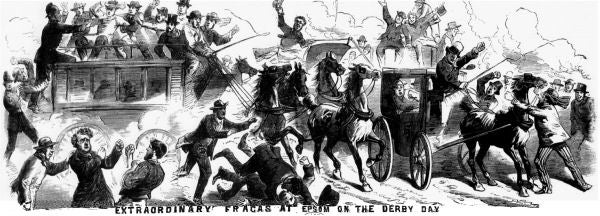Errors & Omissions: Fracas, to rhyme with jackass, now there’s a word worth fighting for
Plus the difference between perishing and fighting for your life in this week’s Independent

The world awaits this column’s verdict on “fracas”, the word the BBC used to signify whatever it was that Jeremy Clarkson got involved in when, allegedly, nobody would give him a steak. Some people apparently didn’t know what it meant. (Above: an early example from Illustrated Police News, 8 June 1867.)
This is from a Section 2 feature on Thursday: “Another reason that some gave for taking umbrage at the BBC’s usage of the word was that they felt that it was very middle class … That fracas is pronounced like the French – a silent ‘s’ – further signified for many that the channel was being snobby.”
Heavens, not just middle class but “very middle class”! But let that go. Class hatred is etched deep into the English soul, and a mere pedant is never going to persuade writers to stop condemning half the nation, including themselves, for the sin of being middle class.
Let me just report that in the middle-class north London family in which I grew up in the 1950s and ’60s, the word “fracas” was in everyday use and nobody thought it snobby or pretentious. But we pronounced it in an English fashion, to rhyme with “jackass”. A Frenchified “fracah” we would have thought thoroughly affected.
Don’t be bullied out of using “fracas”. It is a usefully vague word, with comic undertones, that allows the speaker to suspend judgement as to whether there was actual violence or not – which is presumably why the BBC used it.
• Thursday’s Big Read referred to Dubai’s “multi-faith ex-pat community”. Remember that “expat” is short for “expatriate” – one who is away from (ex) their own country (patria). It has nothing to do with “ex-” meaning former, so there is no need for a hyphen.
• “French sport stars perish in mid-air crash in Argentina,” said a news headline on Wednesday. Nothing here is outright wrong, but “perish” looks a bit odd. Why use an old-fashioned and poetic word when an everyday equivalent – “killed” – is available and would have fitted the shape of the headline?
• An arts feature on Thursday spoke of puppets from the Eighties TV satire Spitting Image being found “crumbled in their cardboard boxes”. Cloth puppets are surely more likely to be crumpled – crushed together into creases – than crumbled – broken into small fragments.
• On Monday, a News in Brief item reported on a car crash: “Two teenage boys were killed and two more were fighting for their lives after the car they were travelling in left the road and hit a tree.”
“Fighting for their lives” is a journalese cliché so familiar that it has lost whatever emotional impact it may once have had. News reports should stick to a sober account of the facts. In the case of road accident victims, that means telling the reader what the hospital said about their condition. The hospital would have said that the two boys were in a critical condition; why jazz that up into “fighting for their lives”?

Join our commenting forum
Join thought-provoking conversations, follow other Independent readers and see their replies